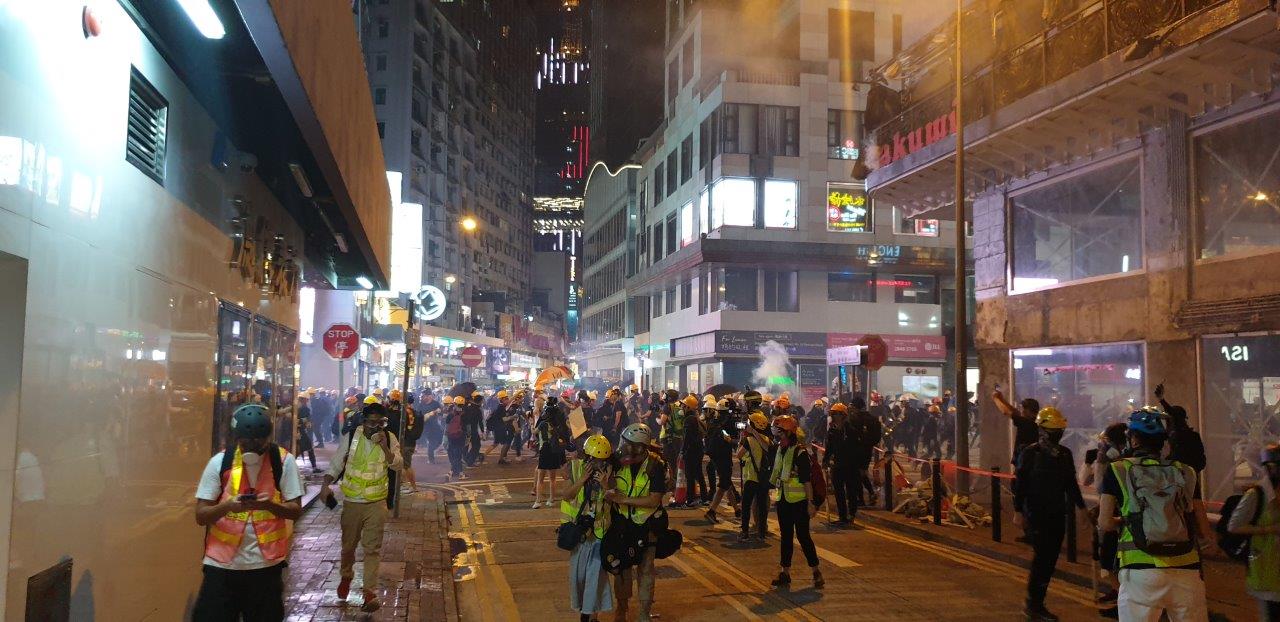
Fraser Howie
co-author of Red Capitalism, The Fragile Financial Foundations of China’s Extraordinary Rise
Over the past few months Hong Kong, home to one of the world’s great skylines, Asia’s leading financial center and tourist mecca, has become a city of protests. 9 June saw an estimated 1 million protesters take to the street to call upon the Hong Kong Government led by Chief Executive Carrie Lam to cancel proposed legislation which would allow extradition from Hong Kong to Mainland China. The bill rushed through without the usual public consultation and review caused widespread concern across all sectors of the society and economy. Even the pro-Beijing business sector was highly concerned as the provisions could find Hong Kong bankers being caught up as accessories to corruption cases, real or fabricated in the Mainland. There were some basic protections yet the lack of trust in the Mainland government and the Hong Kong Government willingness to push back on Mainland demands resulted in the general feeling that Beijing could and would use this bill to extend its reach into Hong Kong society.
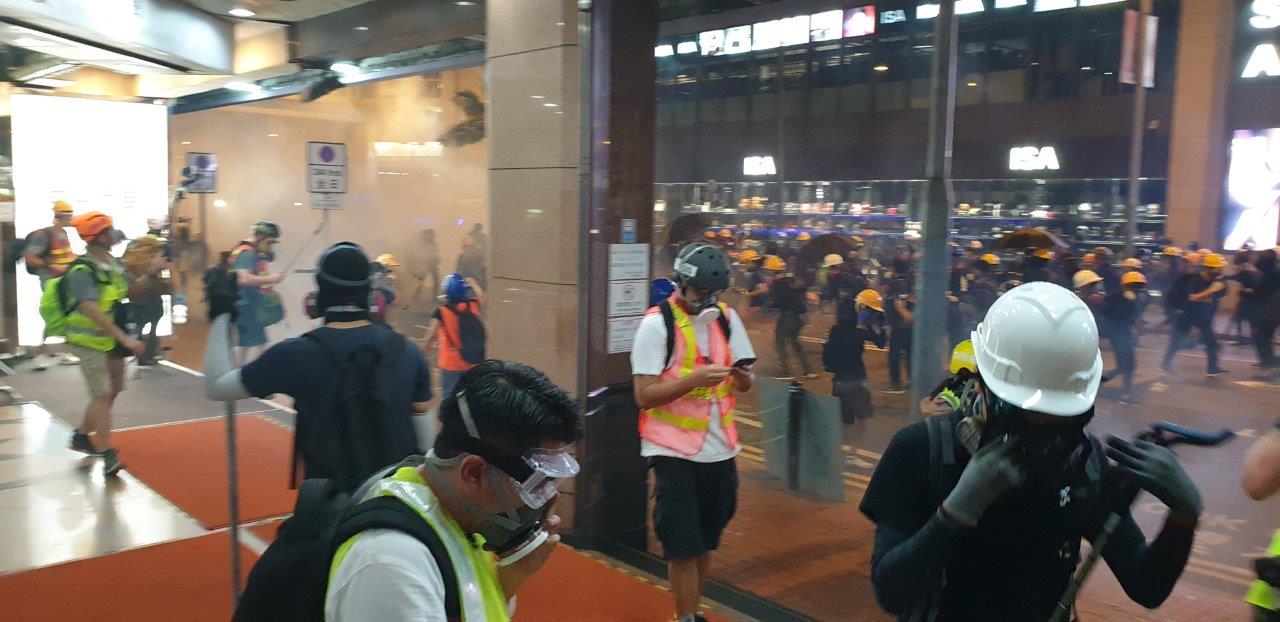
Yet Carrie Lam was unmoved by 1 million citizens taking to the street and a further protest a week later saw possibly double that number on the streets. Having worn white for the first march, the protesters wore black for the second. At last Carrie Lam announced the bill was effectively dead but refused to withdraw it from the legislative order of business allowing, at least in theory, the ability to still push forward with it. Protestors demanded a full withdraw of the bill along with 4 other major demands. Lam was not accepting of any of them. Although saying she would listen to the Hong Kong people she has been noticeably absent over the past months as the city has at times spiraled out of control.
These current protests are the most serious unrest in Hong Kong since 1967 when Communist backed riots resulted in 51 deaths and nearly 5,000 people arrested. But these protests can be seen as part of a long arc of protests as Hong Kong chaffs under the One Country Two Systems which underpinned its return to China in 1997. A quarter of a century ago when Chris Patten became the last Governor of Hong Kong and tried to bring democracy to Hong Kong a common retort was that Hong Kongers are not political and they only care about making money. Few can cling to that mantra now and since the handover both politics and economics have led to where Hong Kong is today. The changes since the handover have been dramatic, Hong Kong has suffered the lows of the Asian Financial Crisis and SARS, an influx of 1.2 million Mainlanders has changed the demographic makeup, soaring property prices have made Hong Kong the most expensive and least affordable property market in the world. Home to dozens of billionaires and incredible wealth yet Hong Kong sees somewhere between 15 to 20% of its population living below the poverty line.
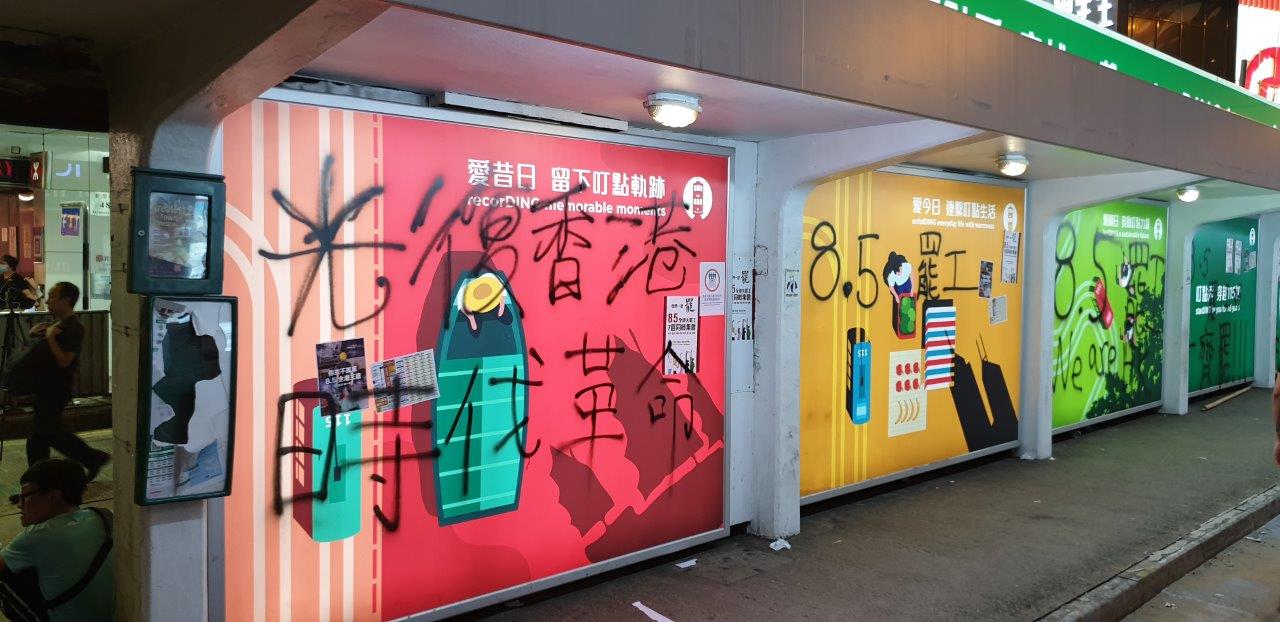
Overlaying these economic stresses is growing and unwelcome interference from Beijing. Under the One Country Two Systems agreement Hong Kong has a high degree of autonomy to conduct its own affairs but this does stop Beijing from the interfering. The first high profile example of Beijing’s reach into Hong Kong was the Article 23 legislation around national security. Then, on 1 July 2003, half a million took to the streets to protest. Since then there has been a series of efforts from the Hong Kong Government which are have been seen to pander directly to Beijing over the heads of the Hong Kong people. The Hong Kong people have been failed by each one of their four Chief Executives since the handover. None have been elected under universal suffrage and are effectively Beijing approved appointees. Here lies the fundamental problem of Hong Kong government. The CE is never representative of the people and the very role of CE is conflicted, instead of serving the Hong Kong people and representing them to Beijing, the CE instead is seen as a Beijing puppet trying to suppress Hong Kong’s way of life.
The last push for universal suffrage came in 2014 and the failure to implement genuine democratic reform led to the Occupy protests which saw tens of thousands camp out in Admiralty in Hong Kong blocking the streets for over two months. That unprecedent show of political conscience from Hong Kongers ultimately failed but from failure has sprung the society wide anger seen over the past two months. Well before the near daily outbursts of violence of July and August there was a real feeling that “we failed 5 years ago we can’t fail this time”. That has allowed a small section of the protesters to engage in significant vandalism, destruction of public property and severe civil disturbance, yet still maintain strong support from many segments of the society.
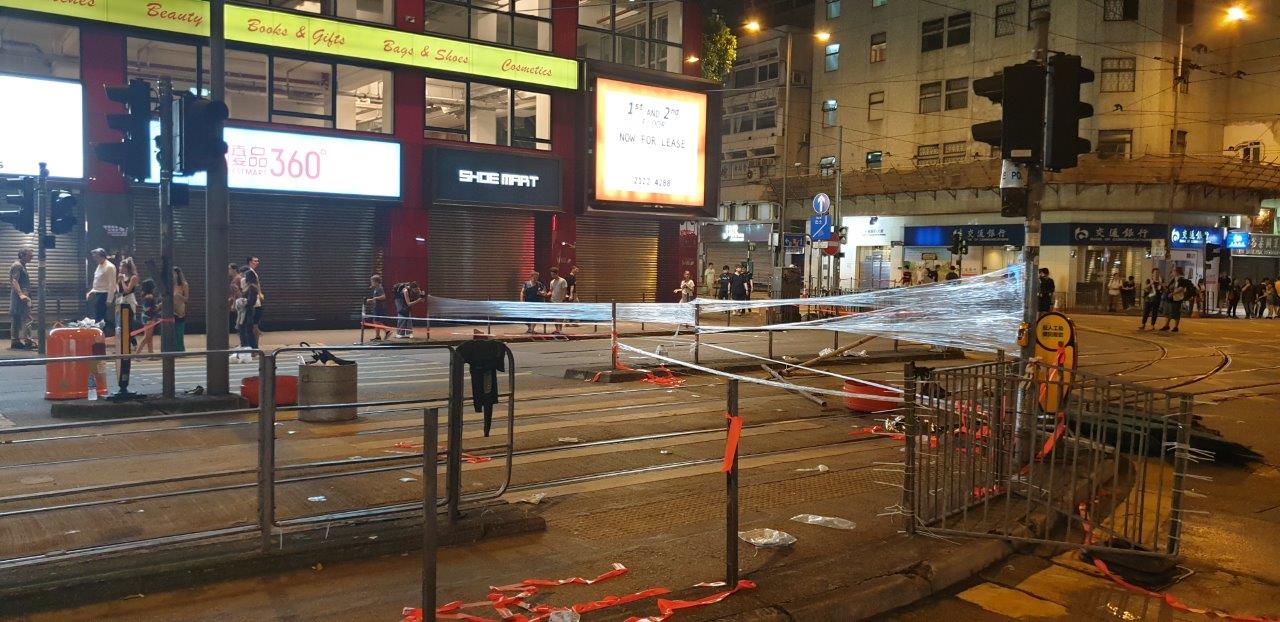
There have been frankly unbelievable scenes in the past two months as splinter groups from the larger peaceful protests have broken off and laid siege to the Police HQ and local police stations, have broken into the Legco legislative chamber and vandalized the building with anti-government slogans. And even dared to attack the Beijing Liaison office in Hong Kong which acts as de facto Chinese embassy in the city.
The protest movement has 5 broad aims, the complete removal of the Extradition Bill, an independent inquiry into police brutality, retraction of the “riot” characterization of the early protests, immediate release and dropping of charges against those already arrested and universal suffrage. The government has moved on none of these. The Extradition Bill has been indefinitely suspended, has been declared “dead” by the Carrie Lam, yet it remains on the legislative calendar.
What started as million people marches through Hong Kong where protesters were so well behaved they stayed late or came back the next day to collect their rubbish, has largely been replaced by a mixture of approved rallies and marches on the back of which smaller groups of protesters splinter into unapproved rallies looking to disrupt traffic and provoke the police into attacking them. These protesters are largely leaderless and have developed an effective yet simple communication and organizational system via chatrooms and social media to deal with the heavy-handed police tactics of tear gas and rubber bullets. The use of tear gas in the Occupy protests prompted many to come out in support of the fellow citizens. Now tear gas is a near daily occurrence with nearly 2000 canisters being fired since June.
Since the beginning of the unrest Beijing has signaled that the Hong Kong Government has its full support and that the Hong Kong Police Force is capable of containing the violence. This has meant that Carrie Lam has not moved on the protesters demands while the police, and in response the protesters have both stepped up the level of violence. Black clad and masked protesters are engaged with the Hong Kong police in a cat and mouse game around Hong Kong. The protesters tactics of “be water”, fluid, mobile, and changing, proved successful in spreading disorder and disruption but it hasn’t delivered any strategic gains. The worry for those who support their demands is that the longer this goes on the less impact these tactics will have.
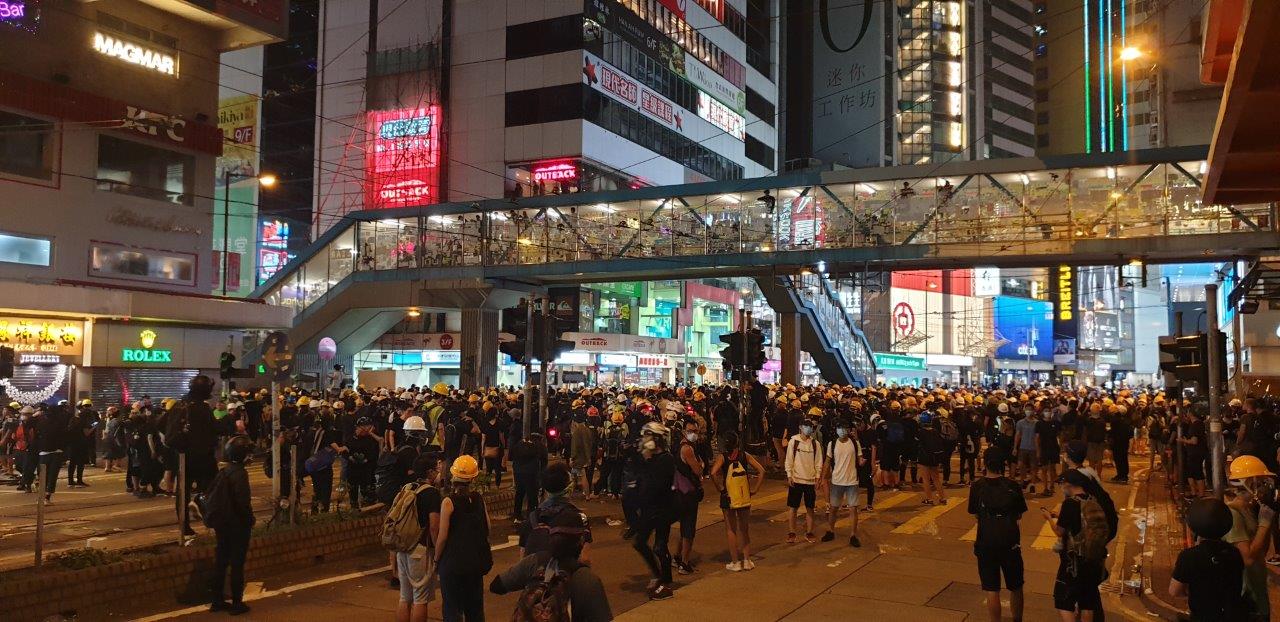
Hong Kong presents a complicated and confusing picture. It is a strange mix of the usual hustle and bustle of the city, deadly quiet as splinter groups effectively close down entire streets waiting for the police, outright riots with bricks and petrol bombs coming from one side and rubber bullets and tear gas from the other. Roads and rail lines which are open one minute can become closed off within minutes making commuting a nightmare at times. The airport was closed down on Monday due to thousands of black shirted but peaceful protesters. After closing the airport their online forums voted overwhelming to leave and regroup the next day. The city can appear to be in chaos. But the question is how does Hong Kong move forward from this?
Carrie Lam has shown herself completely out of touch with the Hong Kong people and has lost the trust of everyone except perhaps Beijing to whom she remains loyal. She will never get a second term as CE and surely it is only a matter of time before she resigns for health reasons, but only after the violence has stopped.
More importantly is the need for a genuine independent inquiry into police brutality. The police have been under tremendous pressure but there can be no excuse for some of the excesses and violence directed against many protesters. Their rules of engagement need to be examined as this weekend saw them fire tear gas within the subway station in an enclosed area. Hong Kong has seldom witnessed this style of unrest and lack of experience on the part of the police must have played a part but only via an inquiry can trust be restored. The attack on members of the public by a white shirted mob in Yuen Long with the police nowhere to be seen, nor responding to emergency calls is a damning indictment of what is often seen as Asia’s finest police force. It is very much in the police’s interests that an open and honest inquiry be conducted.
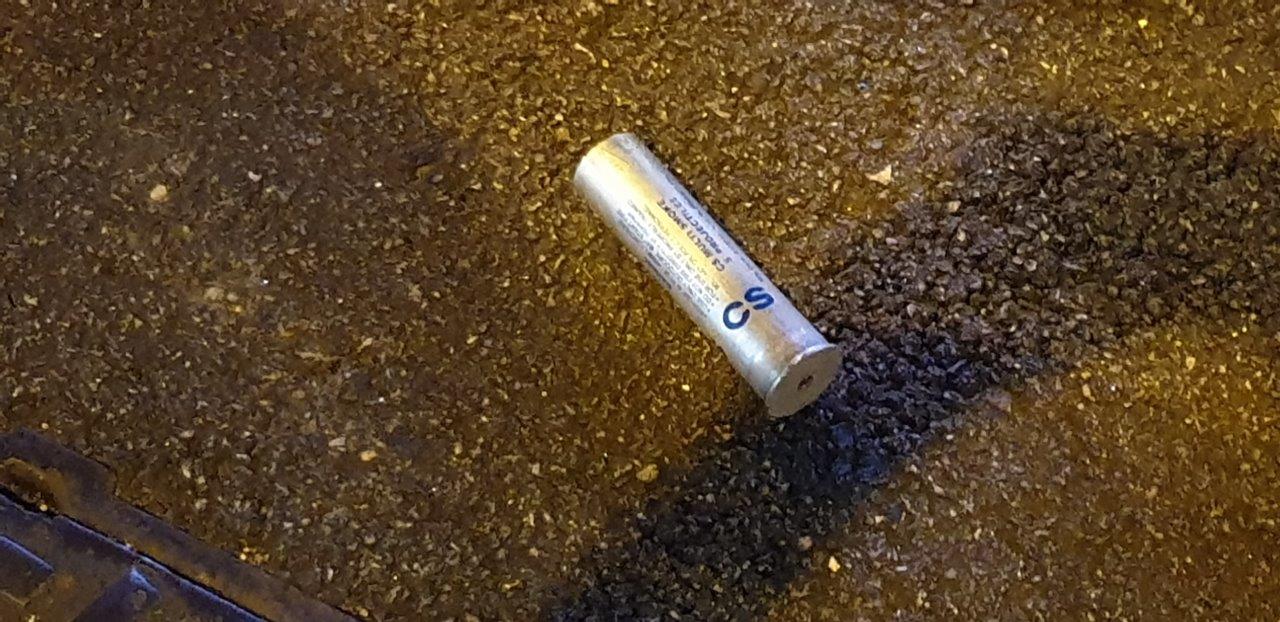
The protesters also need to mitigate some of their demands. Blanket demands for no prosecution of protesters or of that their demonstrations are no riots seem off the mark especially as the weeks progressed. But the protest groups have no clear leaders and while giving them fluidity in the daily cat and mouse it means there is no one to actually engage with to discuss demands, compromises and a way forward.
Police officers enforce the law, they are not above it, nor though does donning a yellow hard hat and black T-shirt make you immune from prosecution either. An accounting on all sides need be made.
For Hong Kong to go forward it is essential that the Hong Kong Government listens and understands how the failures of Occupy led to the anger underpinning the anti-Extradition Bill protests, both the peaceful ones and the violent ones. It nothing substantive comes in the way of concessions from the government nor show a willingness to embrace the demands of the Hong Kong people then resentment and anger will only grow leading to an even more extreme response next time.
The underlying fear for Hong Kong is that “Beijing will send in the tanks”. A PLA garrison is already stationed next to the Legco building yet all indications are that they are very unlikely to be deployed. But observers inside and outside of Hong Kong should not doubt Beijing’s resolve to enforce its rule, directly or indirectly in Hong Kong. Those thinking that Hong Kong independence is possible are deluding themselves and playing a dangerous gain. China may have its problems and weaknesses, but the Central Government is not on the point of collapse. Hong Kong maybe small and a headache for Beijing but they are not going to let it go its own way. Beijing has always struggled with the periphery, whether it be Tibet, Xinjiang, Taiwan or Hong Kong.
With stronger willed Chief Executives prepared to push back against Beijing and for Hong Kong, with stronger international pressure earlier to ensure Beijing abided by the One Country Two Systems formula today’s Hong Kong could have looked very different, but what ifs are of little use now. Hong Kongers need to find a way to come together again, not to ignore what has happened but to address it and find a way to move forward preserving what makes Hong Kong such a unique place. It is arguably the most successful Chinese society in Chinese history, yet today’s its future looks very uncertain. Future paths are of course unknown but instead of hastening Hong Kong’s demise there is still a chance that the past two months of protest, disruption and violence forces the Hong Kong Government to realign itself with its people and readjust its relations with Beijing.
(This paper was written on 12 August)
カテゴリー
最近の投稿
- 習近平の思惑_その3 「高市発言」を見せしめとして日本叩きを徹底し、台湾問題への介入を阻止する
- 習近平の思惑_その2 台湾への武器販売を躊躇するトランプ、相互関税違法判決で譲歩加速か
- 習近平の思惑_その1 「対高市エール投稿」により対中ディールで失点し、習近平に譲歩するトランプ
- 記憶に残る1月
- 高市圧勝、中国の反応とトランプの絶賛に潜む危機
- 戦わずに中国をいなす:米国の戦略転換と台湾の安全保障を巡るジレンマ
- トランプ「習近平との春節電話会談で蜜月演出」し、高市政権誕生にはエール 日本を対中ディールの材料に?
- A January to Remember
- Managing China Without War: The U.S. Strategic Turn and Taiwan’s Security Dilemma
- 「世界の真ん中で咲き誇る高市外交」今やいずこ? 世界が震撼する財政悪化震源地「サナエ・ショック」



